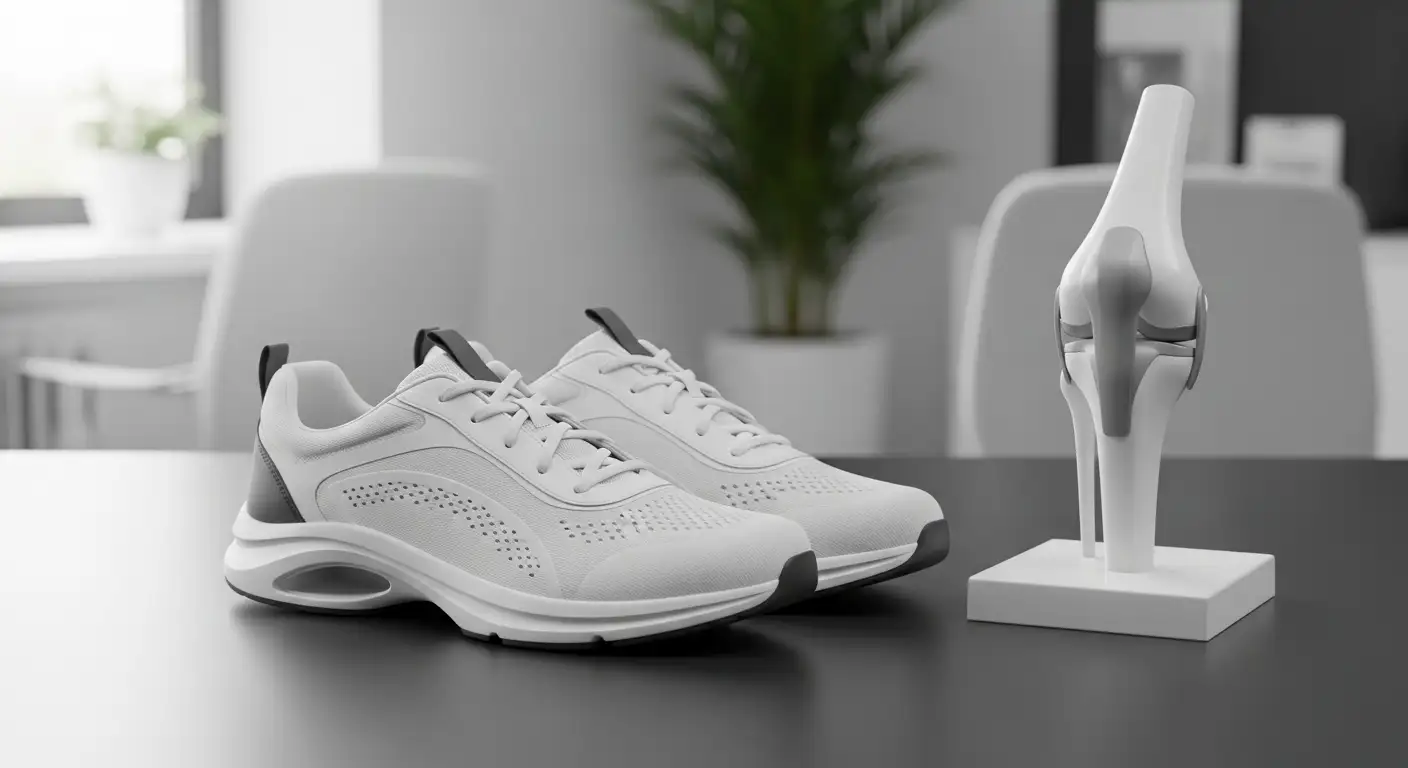Understanding Knee Pain Upon Waking
Knee pain upon waking is a common issue that affects many people. It is typically characterized by discomfort and stiffness in the knee joint upon arising from a night's rest. This section will delve into the common causes of morning knee pain, as well as its symptoms and severity.
Common Causes of Morning Knee Pain
There are several reasons for experiencing knee pain upon waking. These include but are not limited to arthritis, bursitis, and tendinitis, all of which can cause morning stiffness and discomfort in the knee.

Osteoarthritis, an inflammatory condition that affects the cartilage surrounding the knee joint, is one of the most common causes of knee pain in the morning [2].
Another potential cause of knee pain upon waking is stiffness from prolonged immobility during the night. Regular movement and exercises can help alleviate this issue [3].
Symptoms and Severity of Morning Knee Pain
The symptoms and severity of knee pain upon waking can vary among individuals. The discomfort might be a dull ache, a sharp, stabbing pain, or a feeling of stiffness in the knee joint. The severity can range from mild, which subsides after moving around, to severe, which persists and interferes with daily activities.
Morning knee stiffness is a common occurrence as the synovial fluid in the joints thickens after a period of inactivity during sleep, leading to what experts call "morning gel." This phenomenon is more noticeable as individuals age due to reduced production of synovial fluid. If the stiffness subsides once movement begins and there is no pain, it is generally not a cause for concern.
However, if knee pain upon waking persists, worsens, or is accompanied by other symptoms such as swelling, redness, or inability to move the joint, it may indicate a more serious condition that requires medical attention. The understanding of these causes and symptoms is a crucial step towards addressing knee pain upon waking, enabling individuals to seek appropriate treatment and preventive measures.
Potential Risks and Complications
Understanding potential risks and complications related to knee pain upon waking can help individuals take proactive measures to manage their symptoms effectively. This includes awareness of chronic conditions linked with knee pain and the role of sleep disturbances in exacerbating knee discomfort.
Chronic Conditions Linked to Knee Pain
Knee pain is cited as the most common cause of musculoskeletal discomfort and poses a significant public health burden. The neurobiological causes behind knee pain are not entirely understood, but sleep problems have been suggested as a potential factor contributing to the increase in chronic pain symptomatology, driven by changes in the central nervous system [5].
A study examining the association between brain aging and self-reported sleep and pain measures revealed a significant connection between brain aging, sleep-related impairment, and self-reported pain measures. This correlation was found to be significant even after controlling for age, sex, race, and study site. The study further showed that brain aging significantly mediated the effect of sleep-related impairment on clinical pain and physical symptoms in the participants [5].
Sleep Disturbances and Knee Pain
Disturbed sleep is a common experience for individuals with chronic knee pain. Joint discomfort can lead to increased discomfort during night hours because the body releases less cortisol, an anti-inflammatory hormone that helps reduce pain and inflammation, during sleep. The pooling of inflammatory chemicals in joint fluid can further cause stiffness overnight.
People with arthritis or joint problems often face more sleep disturbances as their affected joints can keep them up at night or wake them throughout the night. This can lead to difficulties in finding a comfortable sleeping position.
Understanding the complex relationship between chronic conditions, sleep disturbances, and morning knee pain can help individuals and healthcare providers develop effective strategies for managing knee discomfort upon waking. This may include lifestyle modifications, appropriate sleep positions, and targeted exercises to alleviate knee pain.
Effective Remedies for Morning Knee Pain
For individuals experiencing knee pain upon waking, there are several effective home remedies and exercises that can help alleviate discomfort. While consultation with a healthcare provider is recommended for persistent or severe knee pain, these remedies and exercises can serve as a first line of defense in managing and improving knee pain.
Home Remedies for Knee Pain
There are a variety of home remedies that can help alleviate knee pain at night. Some of these include:
- Applying ice: Cold therapy can help reduce inflammation and numb the surrounding area, providing temporary relief from pain.
- Over-the-counter pain medications: Non-prescription medications like ibuprofen or acetaminophen can help reduce pain and inflammation.
- Gentle stretching: Light stretching exercises can help improve flexibility and reduce stiffness that may contribute to knee pain.
- Using a knee brace: Knee braces can provide additional support to the knee, reducing strain and helping to alleviate pain.
It can also be helpful to keep a journal to track the frequency and severity of knee pain, as well as any potential triggers. This can help both you and your healthcare provider identify the underlying cause of the pain.
Exercises for Knee Pain Relief
Exercises can play a crucial role in managing and reducing knee pain upon waking. Strengthening the muscles around the knees can help alleviate knee pain and improve mobility. Some exercises that can help include:
- Leg lifts: Strengthening the quadriceps muscles at the front of the thigh can provide more support to the knees.
- Hamstring curls: Strengthening the hamstrings at the back of the thigh can help balance the support to the knees.
- Calf raises: Strong calf muscles can help take some of the strain off the knees.
- Quadriceps stretches: Stretching these muscles can help prevent them from pulling too hard on the kneecaps.
In addition to these, low-impact exercises like swimming, water aerobics, and cycling can be beneficial. They strengthen the knee muscles without putting too much stress on the joints. Balance and coordination exercises can also improve knee stability, reducing the risk of falls or further injury.
Remember, it's important to consult with a healthcare provider or physical therapist before starting a new exercise regimen, especially if knee pain persists. This ensures that the suggested exercises are appropriate for the specific condition causing the pain.
The Role of Lifestyle Factors
Lifestyle factors play a significant role in managing knee pain upon waking. Aspects such as weight, stress, and footwear can directly impact the severity of knee discomfort.
The Impact of Weight and Stress
Maintaining a healthy weight is crucial for reducing knee pain and improving overall joint health. Excess weight can put unnecessary strain on the knee joints, leading to increased pain and discomfort, especially in the morning.
Stress management is another vital component in managing knee pain. High stress levels can contribute to physical discomfort, including knee pain [8]. Engaging in stress-reducing activities such as yoga, deep breathing, and mindfulness meditation can significantly reduce knee pain and improve joint health.
The impact of weight and stress on knee discomfort is significant and should be addressed for effective management of knee pain upon waking.
Importance of Appropriate Footwear
Another critical lifestyle factor that can impact knee pain is the use of appropriate footwear. Shoes that do not provide adequate support can lead to improper joint alignment and increase the risk of knee pain [8].
It's crucial to choose shoes that offer good arch support and cushioning to minimize stress on the knees. Moreover, when participating in activities such as running or other high-impact sports, it's important to wear shoes specifically designed for these activities to protect the knees from injury and strain.
Wearing appropriate footwear plays a vital role in preventing knee pain and maintaining joint health. In conclusion, understanding the role of lifestyle factors can significantly help in managing and preventing knee pain upon waking.
When to Seek Medical Attention
While knee pain upon waking is a common issue, it's important to understand when it becomes necessary to seek medical attention. Not all knee pain is indicative of a serious condition, but there are certain signs and symptoms that should prompt consultation with a healthcare provider.
Signs to Consult a Healthcare Provider
If knee pain upon waking is persistent, severe, or interfering with your ability to sleep, it is essential to consult with a healthcare provider. Additionally, if morning knee pain persists for more than an hour, it could be indicative of autoimmune conditions like rheumatoid arthritis. Continuous waking up at night due to knee pain or if knee pain affects normal activities in the morning are red flags that should prompt expert consultation [4].
Seeking medical evaluation for persistent knee pain upon waking is essential to determine the underlying cause, receive appropriate treatment, and prevent further progression of joint issues.
Medical Treatments for Knee Pain
In some cases, knee pain at night may require medical treatment, including physical therapy, injections, or surgery. It is important to consult with a healthcare provider or physical therapist before starting a new exercise regimen, especially if knee pain persists, to ensure that the suggested exercises are appropriate for the specific condition causing the pain.
The course of treatment will largely depend on the underlying cause of the knee pain. Physical therapy can help improve flexibility and strength, while injections can reduce inflammation and pain. In more severe cases, surgery may be required to repair damaged parts of the knee.
Remember, it's crucial to consult a healthcare provider to evaluate your condition and recommend the most suitable treatment plan for your knee pain upon waking.
Sleep Positions and Knee Pain
The way individuals sleep at night can significantly impact the severity of knee pain they may experience upon waking. By adjusting sleep positions, it's possible to alleviate some of the discomfort associated with knee pain. Here are some recommendations for the best sleep positions for knee health and some adjustments to improve sleep quality.
Best Sleep Positions for Knee Health
Depending upon the area of pain, different sleep positions can be recommended. For those suffering from knee pain, sleeping on the back with a pillow under the knees or on the side with proper knee support can help alleviate the discomfort.
Furthermore, for individuals dealing with osteoarthritis, a common cause of knee discomfort, sleeping with a pillow between the legs helps maintain a neutral position for the knee. This can significantly reduce the knee pain experienced upon waking.
Adjustments to Improve Sleep Quality
In addition to adjusting sleep positions, incorporating regular movement and exercises into one's routine can help alleviate the stiffness and discomfort that can result in knee pain upon waking. This is primarily because knee pain can be exacerbated due to stiffness from prolonged immobility during the night.
Exercises that improve muscle strength around the knees, such as calf stretches, hamstring stretches, and quadriceps stretches, can aid in alleviating knee issues.
In addition to these exercises, activities like swimming or cycling can be beneficial for knee pain management. They provide a gentle workout that doesn't put too much stress on the knees, which can help reduce knee pain over time.
In conclusion, proper sleep positions, regular movement, and strengthening exercises can all contribute to reducing knee pain upon waking. However, if the pain persists, it's important to seek medical attention to identify the underlying cause and receive appropriate treatment.
References
[1]: https://www.medicalnewstoday.com/articles/325786
[2]: https://www.nathancafferkymd.com/total-joints-blog/what-causes-morning-knee-pain-and-stiffness
[3]: https://www.nhsinform.scot/illnesses-and-conditions/muscle-bone-and-joints/exercises/exercises-for-knee-problems/
[4]: https://stvincents.org/about-us/news-press/news-detail?articleid=52370&publicId=745
[5]: https://www.ncbi.nlm.nih.gov/pmc/articles/PMC10382912/
[6]: https://www.saukprairiehealthcare.org/blog/2023/august/sleeping-with-joint-pain/
[7]: https://www.verywellhealth.com/throbbing-knee-pain-at-night-5112675
[8]: https://www.healthline.com/health/exercises-for-knee-pain





